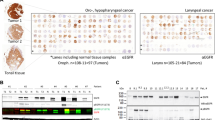Abstract
Tumors with certain mutations in the epidermal growth factor receptor (EGFR) family genes dramatically respond to EGFR inhibitors. Therefore, these mutations are important factors that influence disease progression and patient survival. We previously studied the mutation status of EGFR in patients with head and neck squamous cell carcinoma (HNSCC). However, the mutation status of lymph node metastases and the frequency of mutations in EGFR family genes have not been extensively studied. In this study, we sequenced the catalytic domains of the three other members of the EGFR family, HER2, HER3, and HER4 in 92 clinical samples of HNSCC. We identified a HER2 mutation (K716E) in one sample but no mutations were found in HER3 or HER4. Next to investigate the relationship between EGFR mutations and tumor metastasis, we compared the DNA sequences of the EGFR gene between the primary tumor and the lymph node metastasis in 31 clinical samples. Only one of the patients with an EGFR mutation in the primary HNSCC carried the same mutation (L858R) in the lymph node metastasis. Finally, we explored the tumorigenic potential of the EGFR mutations that we had previously identified and their sensitivity to two different EGFR tyrosine kinase inhibitors (CL-387785, OSI-420). Ba/F3 cells transformed with mutant EGFR genes were sensitive to treatment with lower concentrations of CL-387785 than of OSI-420. These results contribute to our understanding of the genetic basis of drug sensitivity and will help design drugs that specifically target different subtypes of HNSCC.


Similar content being viewed by others
References
Karamouzis MV, Grandis JR, Argiris A (2007) Therapies directed against epidermal growth factor receptor in aerodige stive carcinomas. JAMA 4:298(1):70–82
Lynch TJ, Bell DW, Sordella R et al (2004) Activating mutations in the epidermal growth factor receptor underlying responsiveness of non-small-cell lung cancer to gefitinib. N Engl J Med 350:2129–2139
Hama T, Yuza Y, Saito Y et al (2009) Prognostic significance of epidermal growth factor receptor phosphorylation and mutation in head and neck squamous cell carcinoma. Oncol 14:900–908
Fan Y-X, Wong L, Ding J, Spiridonov NA, Johnson RC et al (2008) Mutational activation of ErbB2 reveals a new protein kinase autoinhibition mechanism. J Biol Chem 283(3):1588–1596
Kobayashi S, Ji H, Yuza Y et al (2005) An alternative inhibitor overcomes resistance caused by a mutation of the epidermal growth factor receptor. Cancer Res 65(16):7096–7101
Yuza Y, Glatt KA, Jiang J et al (2007) Allele-dependent variation in the relative cellular potency of distinct EGFR inhibitors. Cancer Biol Therapy 6:661–667
O-Uchi J, Sasaki H, Morimoto S, et al (2008) Interaction of alpha1-adrenoceptor subtypes with different G proteins induces opposite effects on cardiac L-type Ca2+ channel. Circulation Res 102:1378–1388
Lee JW, Soung YH, Seo SH et al (2006) Somatic mutations of ERBB2 kinase domain in gastric, colorectal, and breast carcinomas. Clin Cancer Res 12(1):57–61
Kim HH, Vijapurkar U, Hellyer NJ et al (1998) Signal transduction by epidermal growth factor and heregulin via the kinase-deficient ErbB3 protein. Biochem J 334:189–195
Soung YH, Lee JW, Kim SY et al (2006) Somatic mutations of the ERBB4 kinase domain in human cancers. Int J Cancer 118(6):1426–1429
Gow C-H, Chang Y-L, Hsu Y-C et al (2009) Comparison of epidermal growth factor receptor mutations between primary and corresponding metastatic tumors in tyrosine kinase inhibitor-naïve non-small-cell lung cancer. Ann Oncol 20(9):696–702
Schmid K, Oehl N, Wrba F et al (2009) EGFR/KRAS/BRAF mutations in primary lung adenocarcinomas and corresponding loco-regional lymph node metastases. Clin Cancer Res 15(14):4554–4560
Yokoyama T, Kondo M, Goto Y et al (2006) EGFR point mutation in non-small cell lung cancer is occasionally accompanied by a second mutation or amplification. Cancer Sci 97(8):753–759
Zhiwei Y, Titus JB, Susumu K et al (2007) Resistance to an irreversible epidermal growth factor receptor (EGFR) inhibitor in EGFR-mutant lung cancer reveals novel treatment strategies. Cancer Res 67:10417–10427
Bonner JA, Harari PM, Giralt J et al (2006) Radiotherapy plus cetuximab for squamous-cell carcinoma of the head and neck. N Engl J Med 354:567–578
Cohen EE, Rosen F, Stadler WM et al (2003) Phase II trial of ZD1839 in recurrent or metastatic squamous cell carcinoma of the head and neck. J Clin Oncol 21(10):1980–1987
Soulieres D, Senzer NN, Vokes EE et al (2004) Multicenter phase II study of erlotinib, an oral epidermal growth factor receptor tyrosine kinase inhibitor, inpatients with recurrent or metastatic squamous cell cancer of the head and neck. J Clin Oncol 22(1):77–85
Siu LL, Soulieres D, Chen EX et al (2007) Phase I/II trial of erlotinib and cisplatin in patients with recurrent or metastatic squamous cell carcinoma of the head and neck: a princess Margaret hospital phase II consortium and National Cancer Institute of Canada Clinical Trials Group Study. J Clin Oncol 25(16):2178–2183
Acknowledgment
This research was partially supported by the Ministry of Education, Science, Sports and Culture, Grant for Scientific Research (C), the Jikei University Research Fund and High Technology Research Center Project for Private University.
Author information
Authors and Affiliations
Corresponding author
Rights and permissions
About this article
Cite this article
Hama, T., Yuza, Y., Suda, T. et al. Functional mutation analysis of EGFR family genes and corresponding lymph node metastases in head and neck squamous cell carcinoma. Clin Exp Metastasis 29, 19–25 (2012). https://doi.org/10.1007/s10585-011-9425-5
Received:
Accepted:
Published:
Issue Date:
DOI: https://doi.org/10.1007/s10585-011-9425-5




